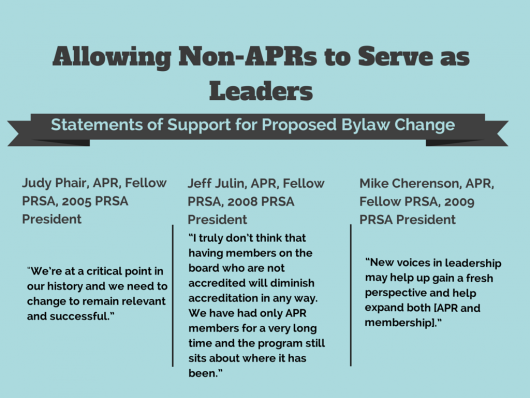As we approach the Delegate Assembly meeting in Washington DC October 11, I’ve had some interesting conversations with a number of PRSA members about the proposed bylaw amendment calling for two non-APR members being allowed onto the PRSA National Board of Directors. It’s a bold move for PRSA, and one that we’ve talked about for a few years but have never made a reality. This time is different.
Why? Because surveys we’ve commissioned by Kelton Research, Ketchum, and Organizational Performance Group clearly show a loud and growing voice among our membership that they want some non-APR members on our National Board of Directors. We can’t ignore the facts in front of us.
Does this dilute the APR? Absolutely not.
In fact, this is a question I’ve heard in a few of the conversations I’ve had. While the individuals I’ve spoken with all believe the bylaw amendment will make our membership stronger, they ask what this move will do to the APR. Will it weaken the credential?
When you consider that there are 17 seats on the national board of directors with only two Director-at-Large positions allocated to non-APR members, it’s evident that the credential still holds value. Any member with or without an APR who qualifies for the National Board of Directors can run for Director-at-Large, so those two seats might not always be occupied by non-APR members. Additionally, in order for those non-APR members to advance to higher positions within the board, they will have to earn the credential as only qualified members who hold the APR may serve as Directors and on the Executive Committee.
When I was elected to the PRSA National Board of Directors representing the Western District as a Director, I was just honored to be there among such capable leaders. I learned so much about leadership my first year, and I continue to learn every day I serve. Those of us on the board learn from each other and admire each other’s strengths. We also recognize that there is a tremendous talent pool within our Society and we haven’t begun to scratch the surface.
We need to bring in new leaders and we can’t do that unless we admit that just because a practitioner doesn’t hold the APR, it doesn’t mean they aren’t outstanding practitioners and leaders with a lot to contribute.
If you had told me back in 2007 when I was chair of the Universal Accreditation Board that I would take this stand, I wouldn’t have believed it. Now I realize that it’s okay for us to be different. We’re all in this to advance the profession. Let’s work together to make PRSA better.
Marisa Vallbona, APR, Fellow PRSA, serves on the PRSA Board of Directors and is president and founder of CIM Incorporated, a Southern California-based public relations firm with offices in Los Angeles and San Diego.She is also the co-founder of PRConsultants Group, a national network of PR firms. She has won four Silver Anvil awards from PRSA and a Silver Anvil Best of Show. You can follow Marisa on Twitter at @mvallbona.








Marisa,
Thank you for addressing some of the concerns I’ve heard about this proposal. Personally, I’m sure it will pass. However, the concern I’ve not heard addressed (and I’ve not been party to every discussion, obviously) is what’s next?
Once, delegates to the National Assembly had to be APR; that’s not the case anymore. Years ago, a practitioner needed five years of experience to try for APR, but today that’s not necessary. Now, we’re taking two seats out of the APR requirement at the national board level. That’s not to say the proposal shouldn’t be passed, nor is it an argument that delegates should be APR; for some it is a bellwether. How long before more seats are surrendered? Given that 80 percent of our members do not have their APR, how long will it be until a future Assembly votes to eliminate it from the board service requirement completely?
No, this one proposal may not dilute the APR credential, but combined with the past actions, for some it’s just another exhibit in the case against getting one’s APR credential at the extreme and, at a minimum, suggesting the Society is conceding that maybe the APR credential isn’t as powerful as it hoped it would be at one time. (Referencing that this proposal is coming from the national board.)
In addition to sharing with delegates the research that provides the “as-is” state of APR, I hope we can broaden the discussion at the Assembly. For instance, where does the PRSA board see the APR credential five years from now? What actions will be taken to encourage more members to earn it? Why have past efforts failed? Why will future efforts be more productive?
I want to close by recognizing a lot of great practitioners, like you, have spent a considerable amount of time and effort over the years doing heroic work to bolster the credential. I hope my comments are not viewed as critical of what has been done to date, but instead are focused on what happens next — and how members can be part of the solution.
Thanks, again, for expressing your thoughts.
Rick Batyko
Many good comments on this topic and very thoughtful insights from Rich.
What I find bothersome is some of the language that’s being used.
“Surrendering” Board seats seems to imply there’s some sort of a battle going on and that something that benefits 80% of our members is some sort of defeat for the other 20%.
And casting this as an issue of “power” of APRs seems — I hope inadvertently” divisive at a time when our profession needs all the support and unity we can have, as does our Society.
PRSA made a decision decades ago to allow members to have choices — join a section or don’t, serve on a committee or don’t, become APR or don’t. This proposal is simply a step to remove some of what feels like punitiveness aimed at those who choose not to become APR . Right now, 80% of our members have zero representation on the national Board. This will allow that 80% to have two positions representing them on the board, while the other 20% of APR members are represented by 15 people, Can we not think of it as balance and fairness, rather than surrender and loss of power?
I think you’ve both recast my comments and missed my point, but I do appreciate your remarks. I’ve been a member for decades, a chapter presidents for two different chapters, a District officer and chair, a nominee for the 2014 national board and more. I know you meant no ill will in suggesting I was being divisive, and I appreciate your defense of the Society that I love, but I would ask that you consider my comments as reflective of what I am hearing about the future of the APR credential. If we are to have an honest dialogue at the National Assembly, all points of view need to be considered and not judged negatively just because they may not be consistent with our own.
You are arguing the as-is state when I am addressing the what’s next state, which is a valid concern. There is no question this proposal will pass, and probably in a landslide. And, I think it should. The question on the table is what happens next — a stronger APR program or the current tend toward eliminating APR-only requirements for various roles in the Society? That is a simple and honest question that deserves a thoughtful response. Let’s work together on the solution.
Thank you for your reply.
Rick Batyko
The points made in this post, as well as
from Rick Batyko, are all valid considerations for our Society.
As co-chairs of the Strengthening the APR Task Force, Elizabeth Pecsi,
APR, Fellow PRSA and I were charged with looking at how this credential
can flourish another 50 years. No easy task, and one that took many hours
over a 6-month period to assess research data, the OPG report and other
resources as well. The top notch Task Force members (Jill
Hollingsworth, APR/MolsonCoors; Grace Leong, MBA, APR/Hunter PR; Mitchell
Marovitz, PhD, APR/Adjunct Associate Professor) met weekly to delve into
these resources to address how the credential can maintain its longevity
in a profession that has seen great change, especially recently. We
evaluated the governing structure, the exam, and finally the value
proposition to arrive at short, mid and long-term recommendations, which
were presented to the board, and will be share once approved. How that
plays out in a person’s ability to lead is another question entirely and
one that the Task Force determined fell out of its scope.
We believe our Society is strong because our
members are passionate and committed advocates for the profession and the
professional. We also found that members who earn an APR are united around
life-long learning.
Great response, Jane. I agree with your comments. I do hope we can separate the issue that APR is somehow a credential for leadership (which, I think we all agree, is not a logical deduction) from the larger issue of what does this action protend for the APR credential long term. I think the proposal should pass, but I also think we need to be mindful of the signal it, combined with the past actions I noted in my post, sends to the Society’s perceived view of the APR credential.
I don’t think those who made this a requirement for board service years ago meant to alienate anyone; I think they hoped it would encourage more members to get their APR credentials. Well, that didn’t work, and a change needs to be made and it will be made on Saturday.
I hope we can collectively not argue the APR requirement for long. I hope, instead, we spend time on Saturday discussing the what’s next for APR.
Rick
I have long advocated that the national board should be open to all the members and not just those that have the APR designation. I was thrilled to see the note from Joe Cohen regarding the bylaw amendment that would be before the Assembly this weekend.
Offering the opportunity to run for a board position to non-APRs does not dilute the value of the accreditation. It simply allows for others who want to serve, that do not have those three letters after their name, the chance to do so. There are many things that our members should consider when electing our leaders. I was thrilled when Stephanie asked me to pen a blog on this topic, I’ll share the link here: http://prsay.prsa.org/index.php/2014/09/16/expanding-the-candidate-base-is-a-good-thing-for-prsas-national-board/
I encourage the delegates to vote in favor of this amendment.